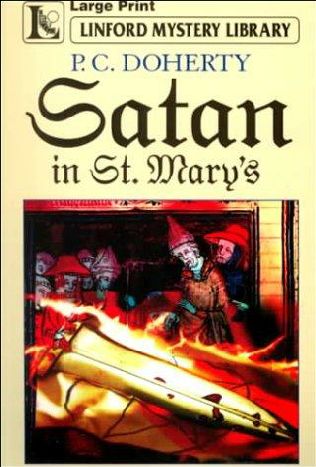 This week's contribution to Pattinase's Friday's Forgotten Books
This week's contribution to Pattinase's Friday's Forgotten BooksPaul Doherty (1946- ) has published an amazing number of books. This week's choice is the first in his Hugh Corbett series, set in the late 13th century. SATAN IN ST. MARY'S was published in 1986, and the 17th in the series is due to be published in 2010.
In addition to the Hugh Corbett series, there are 10 in the Sorrowful Mysteries Of Brother Athelstan, 6 in the Canterbury tales of Mystery and Murder, 6 in the Sir Roger Shallott series, and various others, including 20 set in the Ancient world of Egypt and Rome.
Publisher's Weekly
Building on an actual murder in 1284, Doherty auspiciously begins a mystery series featuring Hugh Corbett, clerk of the King's Bench. Lawrence Duket, goldsmith, kills Ralph Crepyn, moneylender, and flees to London's St. Mary Le Bow for sanctuary. The next day Duket is found hanged inside the locked church, an apparent suicide. Bishop Burnell, Chancellor for King Edward I, assigns Corbett to investigate. Burnell fears that the antiroyal Populares party will join with practitioners of devil worshipat this time, ''Christianity is only skin deep.'' Hugh Corbett is threatened and attacked while probing ''a suicide which was really murder which . . . masked treason, sorcery and rebellion.'' The satanist group seems to be centered at The Mitre, a tavern owned by the beautiful Alice atte Bowe, with whom Corbett falls in love. The mystery is neatly done and Doherty's ease of scholarship in giving us the rich sights, sounds and smells of medieval London is masterful.
According to Wikipedia, Doherty writes historical mysteries and novels under the pennames Anna Apostolou, Michael Clynes, Ann Dukthas, C. L. Grace, Paul Harding, and Vanessa Alexander.
I have dabbled in reading Doherty titles over the last 20 years, but by no means all. What about you?
6 comments:
Something of a puzzle to me. I enjoyed his Brother Athelstan books rather a lot -- not made of the stuff of my A-List, the writing a bit wooden, but atmospheric and sound all in all, and most certainly he knows his period. He should, given that he's got an Oxford D.Phil in it. Then I sampled the later Corbetts and the Canterburys and I just couldn't read them, hence my puzzlement. Therein I found the writing very wooden indeed and getting more so with the passing of years. I rather suspected that this stolidity of prose and dialogue came in part from a misguided attempt -- such attempts are always misguided -- to give a sense of the speech of the period. Hard to believe someone like Doherty/Harding would be so daft, but who knows. But I also thought when I discovered how many pennames he uses that mayhap he writes too much. He does rather churn them out Creasey-fashion. Anyway, in all, a disappointment, though I would still recommend the Athelstans.
What fun. Usually I know your books, but this is new to me.
Philip, I agree they tend to be a bit patchy, sometimes a bit of a "thin" read, although the historic background feels authentic. You've got to admire the fact that he seems to hold a full time job, and write so prolifically though, don't you?
Pattio, I think people attracted to these would also read Ellis Peters or the Edith Pargeter titles (rather than the Cadfael ones which are streets ahead)
Well, no, I don't really think I do, Kerrie. I'd much rather he turn out far fewer books of much better quality, assuming he is capable of better in the first place, as the Athelstans cause me to think.
I'm a bit bemused by your response to pattinase. Ellis Peters, aka Edith Pargeter, wrote the Brother Cadfael novels. But I think I see the general point you're making and I agree: Doherty/Harding's novels have less substance than any other mediaeval mysteries I've read, which is to say less than Peters, Tremayne, Jecks, Robb, Frazer, Gregory, et al. I'm not a particular fan of the sub-genre, but I rate Tremayne, in particular, very highly indeed.
Yes, I rather muddled that comment Philip didn't I? Not sure what I really meant now. Thanks for the great list of medievalists. I agree about the Peter Tremayne - I'll have to do a Forgotten Books post about him. I will have a record of one of his books somewhere in my little green book, the source of my forgotten books list.
Post a Comment